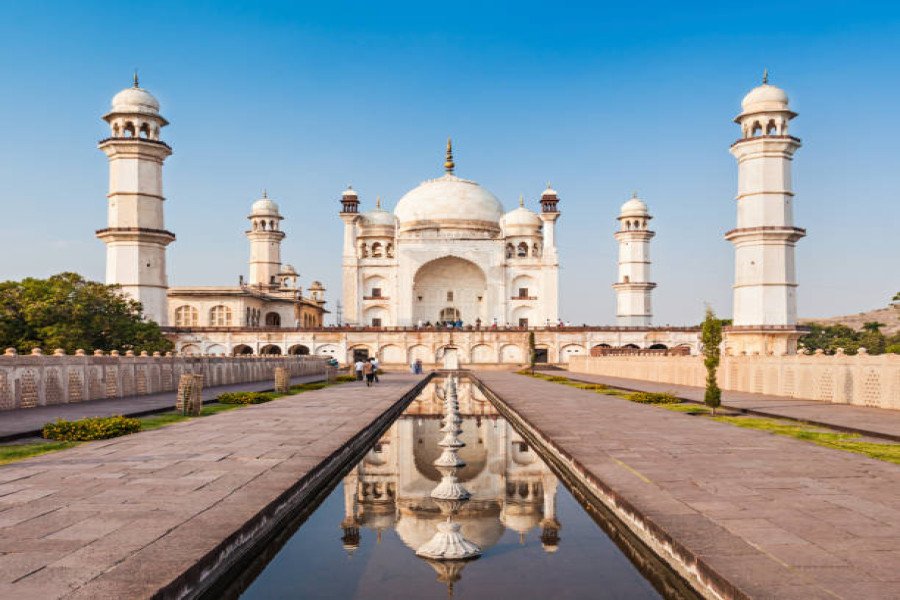
For a comfortable and hassle-free journey to Bibi Ka Maqbara, trust Bharat Taxi Point—your reliable travel partner offering affordable and seamless taxi services.
Travel in well-maintained cabs, including sedans, SUVs, and luxury cars for a smooth ride.
Enjoy doorstep pickup and drop-off from airports, railway stations, hotels, and major attractions.
Our drivers know the best routes and hidden gems in Sambhajinagar, ensuring an enriching experience.
No hidden charges—just budget-friendly taxi services with top-class comfort.
Make your trip to Bibi Ka Maqbara hassle-free and enjoyable with Bharat Taxi Point. Whether you're a history enthusiast, photographer, or traveler, this iconic monument is a must-visit in Sambhajinagar.
📞 Call now or visit our website to book your ride today!
Bibi Ka Maqbara, often referred to as the "Taj of the Deccan," is a stunning historical monument in Sambhajinagar (Aurangabad), Maharashtra. Built in the 17th century by Mughal Emperor Aurangzeb’s son, Azam Shah, this magnificent structure resembles the Taj Mahal and stands as a symbol of love and Mughal architectural brilliance.
For a comfortable and hassle-free journey to Bibi Ka Maqbara, trust Bharat Taxi Point—your reliable travel partner offering affordable and seamless taxi services.
Travel in well-maintained cabs, including sedans, SUVs, and luxury cars for a smooth ride.
Enjoy doorstep pickup and drop-off from airports, railway stations, hotels, and major attractions.
Our drivers know the best routes and hidden gems in Sambhajinagar, ensuring an enriching experience.
No hidden charges—just budget-friendly taxi services with top-class comfort.
Make your trip to Bibi Ka Maqbara hassle-free and enjoyable with Bharat Taxi Point. Whether you're a history enthusiast, photographer, or traveler, this iconic monument is a must-visit in Sambhajinagar.
📞 Call now or visit our website to book your ride today!
Bibi Ka Maqbara, often called the "Taj of the Deccan," is one of India's most underrated yet stunning architectural marvels. Nestled in Aurangabad, Maharashtra, this grand mausoleum is a poignant symbol of love and Mughal craftsmanship. Though often compared to the Taj Mahal, it holds its unique charm and historical significance.
The Mughal Empire was known for its architectural grandeur, blending Persian, Turkish, and Indian styles. Many iconic structures, including the Taj Mahal, Red Fort, and Humayun’s Tomb, were built under their rule, leaving a rich legacy.
Bibi Ka Maqbara was commissioned by Azam Shah, the son of Emperor Aurangzeb, in memory of his mother, Rabia-ul-Daurani, in 1668-69. Unlike Shah Jahan, who spared no expense in building the Taj Mahal, Aurangzeb was known for his frugality, which influenced the construction of this monument.
The monument follows classic Mughal architectural principles with its symmetrical layout, domes, and minarets. It showcases strong Persian influences, evident in its intricate floral designs and delicate calligraphy.
Often called the "Poor Man’s Taj," Bibi Ka Maqbara resembles the Taj Mahal in structure but on a smaller scale. While the Taj Mahal was built with pure white marble, Bibi Ka Maqbara primarily uses plaster-coated stone, giving it a distinct look.
Bibi Ka Maqbara is located in Aurangabad, Maharashtra, a city known for its historical and cultural significance.
By Air: Aurangabad Airport is the closest, about 11 km away.
By Train: Aurangabad Railway Station connects the city to major Indian destinations.
By Road: Well-connected by highways, Aurangabad is easily accessible from Pune, Mumbai, and Hyderabad.
The main tomb structure stands on an elevated platform, with four minarets at its corners. The central dome, though smaller than the Taj Mahal’s, exudes a majestic aura.
Floral motifs, Quranic inscriptions, and intricate latticework adorn the walls, showcasing Mughal artistic excellence.
Following the Charbagh-style Persian garden layout, Bibi Ka Maqbara is surrounded by symmetrical gardens, water channels, and fountains, enhancing its aesthetic appeal.
This mausoleum is a testimony of Azam Shah’s love and respect for his mother, akin to Shah Jahan’s devotion to Mumtaz Mahal.
The monument inspired local artisans and continues to be a cultural landmark in Maharashtra.
The Archaeological Survey of India (ASI) manages the site, ensuring its structural integrity and historical preservation.
Weathering, pollution, and increasing tourism pose challenges to its conservation, necessitating continuous efforts.
The ideal time to visit Bibi Ka Maqbara is between October and March when the weather is pleasant. Avoid peak summer months due to extreme heat.
Ellora Caves – A UNESCO World Heritage Site featuring rock-cut temples.
Daulatabad Fort – A historic fortress with stunning views.
Panchakki – A medieval water mill with beautiful gardens.
Local markets near Bibi Ka Maqbara offer traditional Maharashtrian cuisine and handcrafted souvenirs, making it a delightful experience for visitors.
It was built at a fraction of the cost of the Taj Mahal.
Unlike the Taj Mahal’s pure marble, only the dome of Bibi Ka Maqbara is made of marble.
It is the largest structure built by Aurangzeb’s lineage.
The monument has a museum displaying Mughal-era artifacts.
It is an active historical site visited by thousands annually.
Bibi Ka Maqbara is not just a replica of the Taj Mahal; it is a testament to Mughal love, artistry, and history. While it may lack the grandiosity of its Agra counterpart, it stands as a proud symbol of Aurangabad’s rich cultural heritage. A visit to this enchanting monument is a journey through time, capturing the essence of Mughal grandeur and architectural brilliance.